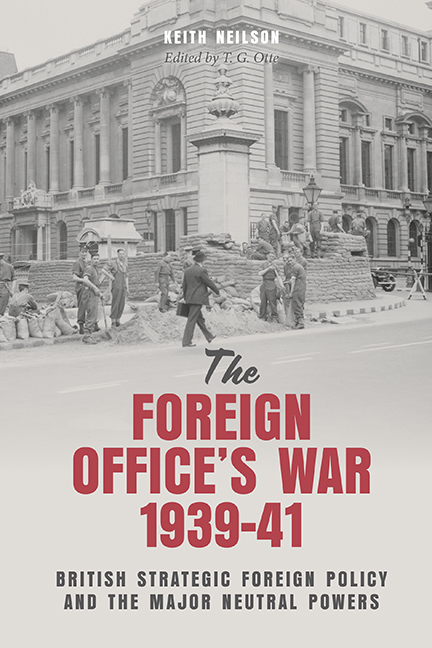Book contents
- Frontmatter
- Contents
- Preface and Acknowledgments
- List of Abbreviations
- Introduction: Keith Neilson and Modern International History
- 1 On the Eve of War: January to September 1939
- 2 The Baltic, Blockade and Soviet Russia: September 1939–June 1940
- 3 Defending the Mediterranean: Italy, Russia and the Balkans, September 1939–June 1940
- 4 Defending Britain and the Far East: The United States, Japan and Soviet Russia, September 1939–June 1940
- 5 ‘Nothing for nothing’: From the Fall of France to Operation Barbarossa: July 1940–June 1941
- Epilogue
- Appendix I Members of the American, Central, Eastern, Far Eastern, Northern and Southern Departments, 1939–41
- Appendix II Dramatis Personae
- Appendix III Keith Neilson, List of Publications
- Bibliography
- Index
Epilogue
Published online by Cambridge University Press: 16 July 2022
- Frontmatter
- Contents
- Preface and Acknowledgments
- List of Abbreviations
- Introduction: Keith Neilson and Modern International History
- 1 On the Eve of War: January to September 1939
- 2 The Baltic, Blockade and Soviet Russia: September 1939–June 1940
- 3 Defending the Mediterranean: Italy, Russia and the Balkans, September 1939–June 1940
- 4 Defending Britain and the Far East: The United States, Japan and Soviet Russia, September 1939–June 1940
- 5 ‘Nothing for nothing’: From the Fall of France to Operation Barbarossa: July 1940–June 1941
- Epilogue
- Appendix I Members of the American, Central, Eastern, Far Eastern, Northern and Southern Departments, 1939–41
- Appendix II Dramatis Personae
- Appendix III Keith Neilson, List of Publications
- Bibliography
- Index
Summary
As the British discovered, the pursuit of peace still depended on power.
Keith NeilsonIt has always been tempting to assume, like the ancient Roman, that diplomacy falls silent amidst the clash of weapons. This was never entirely true. It was certainly not so during the opening, largely European, phase of the Second World War, as The Foreign Office's War, 1939–41 demonstrates in masterly fashion.
It brings fresh light into a period still overshadowed by the Churchillian myth, culminating in the belief that the years 1940–41 were the nation's ‘finest hour’. This belief has left an indelible imprint on national mythology. It has also coloured the historiography of that period. When, in the early years after the Second World War, Winston Churchill wrote his six-volume history of the conflict, he established the framework for analysis that has retained much of its interpretative dominance largely undiminished. In the Churchillian version of events, the period from the outbreak of war to 1941 was one in which Britain's failure to arm in the 1930s, against Churchill's advice, inevitably led to the period of the ‘phoney war’, followed with equal inevitability by the fall of France in June 1940. After this, Britain and the Empire ‘stood alone’. The Royal Air Force – ‘the few’ – provided for the air defence of Britain – ‘the many’. On the oceans, the Royal Navy attempted to ensure that the sea lanes remained open to British commerce. On land, the army provided for home defence, fought in North Africa and kept Egypt safe from Italian attacks. This period of ‘Britain alone’ – the country's ‘finest hour’, so brilliantly captured by David Low's famous cartoon and by Churchill's equally brilliant rhetoric – ended in 1941 with the German attack on the Soviet Union and the Japanese assault on Pearl Harbor. Together they ushered in the period of the ‘Grand Alliance’.
Missing from the Churchillian analysis is the fact that the period from 1939 to 1941 was the most complicated and important portion of the war with respect to British diplomatic activities. This is of particular importance. During and after the First World War, the Foreign Office had been criticised for its activities. It had not, the critics alleged, either added to Britain's allies by bringing neutrals over to the side of the Entente or prevented neutrals from joining the Central Powers.
- Type
- Chapter
- Information
- The Foreign Office's War, 1939-41British Strategic Foreign Policy and the Major Neutral Powers, pp. 293 - 296Publisher: Boydell & BrewerPrint publication year: 2022

